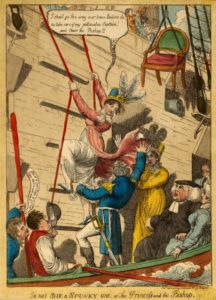 Regency Sea Travel 101
Regency Sea Travel 101
Shereen Vedam
Hang on, there’s stormy weather ahead! And a bit of a history lesson.
The “Regency” era covers the period 1811 to 1820, when Prince George IV became Regent of England because his father, King George III, due to a malady, was declared incapable of performing the necessary royal functions.
During most of the Regency period and before, passengers who wished to travel by sea had to make do with paying for the privilege of boarding a vessel that primarily carried cargo and mail. It was only in 1818 that the Black Ball Line was founded to provide a regular service for passengers aboard its packet ships from the United States to England.

“I shall go the way our brave Sailors do, so take care of my petticoates, Captain and chair the Bishop!” Is not She a Spunky one…or the Princess and the Bishop
Before then, the best way to travel from England to Europe or elsewhere was on board a merchant vessel. As an island, England needed to conduct trade to and from India, China, West Indies, Canada and elsewhere, bringing in raw goods like rice, rum and precious spices, and carting away manufactured textiles, pottery and metallic goods. Therefore, lots of merchant vessels plied their trade between Britain and many of its colonies.
These sea voyages came to a crashing halt once the Peninsula War between England and France began. You see Napoléon Bonaparte had placed his brothers as kings of neighboring countries in order to create puppet states and dominate Europe. The moment he tried that ploy with Spain and Portugal, it instigated a widespread populace uprising against French occupation. And thus began the Peninsula War.
This war lasted from 1808 to 1814, and during that time, travel by the general public to Europe was hindered by Britain imposing a series of decrees (Orders in Council) in 1807. These decrees restricted the movement of merchant vessels seeking to trade with European countries.
Side note: these trade restrictions imposed by Britain was partly responsible for the American War of 1812.
Moving on. After Napoleon Bonaparte abdicated in April of 1814, the Peninsula War ended, and trading vessels once again sought ways to make money through sea travel to Europe. Despite the war ending, however, travel by sea remained perilous and uncomfortable. Cabins were cramped, food was terrible and the cost exorbitant.
Nowadays, we can simply board an engine powered cruise ship or ferry knowing that if trouble arose, there would be lifeboats and marine evacuation chutes to take us to safety. We can be fairly confident the crew will be well-trained to combat emergency situations because regulations require that vessel crew regularly practice evacuation drills. We also know that when we are served a meal, the quality is covered by food safety laws.
During Regency times, however, travel by sea wasn’t so safe, well catered or easy. For a woman, simply getting on board was an impediment. Take a quick read of the excerpt below and see how my heroine reacts to having to climb up a slippery ladder in order to board a tall ship.
————————–
EXCERPT from A Perfect Curse
As their skiff neared the Magdalena, sailors greeted them with shouts and cheers. Nevara was dismayed to see that she would be required to climb aboard by way of a long slippery rope ladder.
 Lord Terrance strapped his dog to his chest with a rope he had brought for that purpose and scaled upward as if he did this sort of thing every day. His lordship’s valet, Ellison, a meticulously groomed slender man, stood ready to assist the others. Lady Terrance confidently tied her skirts higher, exposing her ankles but allowing her to climb the ladder and follow her husband.
Lord Terrance strapped his dog to his chest with a rope he had brought for that purpose and scaled upward as if he did this sort of thing every day. His lordship’s valet, Ellison, a meticulously groomed slender man, stood ready to assist the others. Lady Terrance confidently tied her skirts higher, exposing her ankles but allowing her to climb the ladder and follow her husband.
Once his employers were out of earshot, Ellison began to mutter about the dire consequences of this accursed voyage. He bent to offer Nevara a hand up. On closer inspection, the valet’s proud manner did not match his red-rimmed eyes or his unsteady footing. She wondered if his swaying movement had more to do with the smell of spirits on his breath than the rocking of the skiff. He was more likely to tip her overboard than help her ascend the ladder. Behind her, the other servant, Lady Terrance’s maid, Mendal, a gaunt woman in her late forties, crossed herself and murmured a psalm.
Nevara hitched up her skirts as she had seen Lady Terrance do and grabbed onto the rope ladder. She then made her careful way up. Her skirts still proved a nuisance as they caught beneath her feet at the back. Taking one hand off the rope ladder to free herself, she swayed dangerously to the side.
“Careful,” Lord Terrance called from the top. “Keep both hands on the ladder, Miss Wood.”
Easier said than done. Her tight grip kept slipping on the slimy rope ladder. She hiked her skirts again until both her feet could find purchase on the steps. Still on the skiff, Mendal was reciting a gloomy biblical verse in rhythm to Nevara’s every slippery step.
At the top, Lord Terrance pulled her over the railing with a strong heave and a stout, “Well done, Miss Wood.” His mischievous grin and a glance down to his servants suggested he understood her misgivings. His beautiful wife, too, seemed to be hiding a smile.
Nevara was not amused. She had to share a cabin with Mendal during the upcoming voyage. She hoped the lady’s maid would desist from this worrisome praying. She had enough concerns to accompany her all the way to Cadiz.
Pick up A PERFECT CURSE for just $0.99! Only through the end of September!





